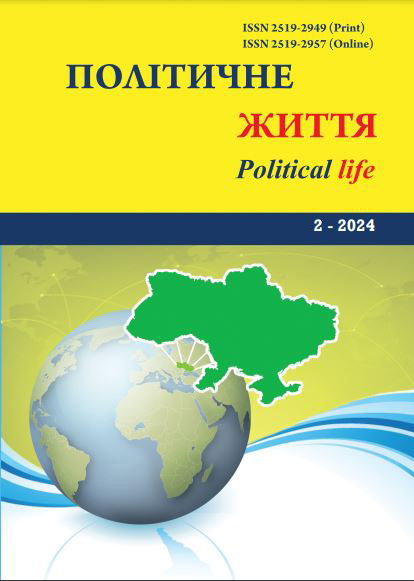The Problem Field of International Terrorism in Ukrainian Social and Political Discourse: New Research Strategies
DOI:
https://doi.org/10.31558/2519-2949.2024.2.28Keywords:
terrorism, international terrorism, analytical scheme, terrorist organization, terrorist act, threat, securityAbstract
The article is aimed at considering the problematic field of international terrorism, the aspects of which are presented in the domestic social and political discourse, from the standpoint of determining new strategies for its further study in the context of the formation of the information society.
Attention is focused on the heuristic potential of the analytical scheme of the analysis of social and political phenomena of the American scientist L. Coser. The main idea of the strategy is to find a group of interrelated indicators (variables) that are able to specify the content, conditions for the emergence and development of this sought-after element of social reality.
The presented research results are systematized according to the following analytical groups: interpretation of the concept of «international terrorism»; forms of manifestation of international terrorism; signs of international terrorism; models of functioning of international terrorist organizations.
It is substantiated that during the entire period of evolution of international terrorism, the most significant changes are observed in its functioning models. The «traditional» one, associated with the capabilities of the industrial society, is being replaced by the «network» one, based on the information and technological potential of the post-industrial society.
It is proven that under the conditions of the development of the information society, the changes that will take place in this element of social and political reality will be manifested, first of all, in: improving the organizational structure of the terrorist group; changing the tactics of implementing terrorist activities; improvement of methods and means of implementing terrorist acts; the growth of the resource potential of terrorist organizations (both at the level of financial support and personnel).
It is proposed to consider the mentioned changes (in the context of forecasting the possible consequences of the implementation of certain terrorist acts) from the standpoint of the application of game theory (for example, in the variant of geopolitical games) and the method of quantification.
References
Гбур З.В. Теоретико-методологічні засади поняття «міжнародного тероризму». Державне управління: удосконалення та розвиток. 2021. №2. URL: http //nbuv.gov.ua/UJRN/Duur_2021_2_5/ (дата звернення 02.04.2024).
Громівчук І.М. Міжнародно-правове визначення тероризму як основа для ефективної боротьби з ним. Науковий вісник Інституту міжнародних відносин НАУ. Серія: економіка, право, політологія, туризм. 2011. Том 2. №4. С. 108-112.
Кормич Л.І., Кормич А.І. Новий формат загроз міжнародного тероризму. Актуальні проблеми політики. 2019. Вип.63. С.6-19.
Лікарчук Д.С. Політичний тероризм: форми прояву. Міжнародні відносини: теоретико-практичні аспекти. 2020. Вип.6. С. 32-43. DOI: https://doi.org/10.31866/2616-745x.6.2020.218770.
Мамчин М.М. Маркетинговий погляд на тероризм. Економіка та суспільство. 2022. Вип. 45. URL: https://economyandsociety.in.ua/index.php/journal/article/view/1923 (дата звернення: 29.03.2024).
Марков К.А., Бєляєва Є.О. Міжнародний тероризм як міжнародний злочин. Юридичний науковий електронний журнал. 2021. № 10. С.596-598.
Coser L. Continuities in the Study of Social Conflict. New York: Free Press, 1967.

